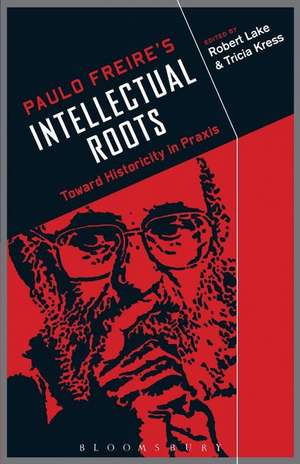Paulo Freire's Intellectual Roots: Toward Historicity in Praxis
Editat de Dr. Robert Lake, Professor Tricia Kressen Limba Engleză Hardback – 6 iun 2013
Preț: 831.03 lei
Preț vechi: 1065.79 lei
-22% Nou
Puncte Express: 1247
Preț estimativ în valută:
159.04€ • 164.29$ • 132.36£
159.04€ • 164.29$ • 132.36£
Carte tipărită la comandă
Livrare economică 25 martie-08 aprilie
Preluare comenzi: 021 569.72.76
Specificații
ISBN-13: 9781441111845
ISBN-10: 1441111840
Pagini: 280
Dimensiuni: 138 x 216 x 23 mm
Greutate: 0.45 kg
Ediția:New.
Editura: Bloomsbury Publishing
Colecția Bloomsbury Academic
Locul publicării:New York, United States
ISBN-10: 1441111840
Pagini: 280
Dimensiuni: 138 x 216 x 23 mm
Greutate: 0.45 kg
Ediția:New.
Editura: Bloomsbury Publishing
Colecția Bloomsbury Academic
Locul publicării:New York, United States
Caracteristici
Illustrates how critical pedagogy is connected to critical philosophical thinkers throughout history and the world.
Notă biografică
Dr. Robert Lake is an Associate Professor at Georgia Southern University, US and teaches both undergraduate and graduate courses in multicultural education from both a local and global perspective. Dr. Tricia M. Kress is an Assistant Professor in the Leadership in Urban Schools doctoral program at the University of Massachusetts Boston, US. She received her Ph.D. in Urban Education from the Graduate Center, City University of New York.
Cuprins
AcknowledgementsPrologue: The Fruit of Freire's Roots by Henry Giroux Introduction: Pedagogy is Not a Teaching Method by Stanley AronowitzContradiction, Consciousness and Generative Words: Hegel's Roots in Freire's Work by Andy BlundenA Dialogue between Marx and Freire by Tricia Kress and Robert LakeThe Gramscian Influence by Peter MayoRethinking Freire's "Oppressed": A "Southern" Route to Habermas's Communicative Turn and Theory of Deliberative Democracy by Raymond Morrow Freire, Buber, and Care Ethics on Dialogue in Teaching by Nel NoddingsConverging Self/ Other Awareness: Erich Fromm and Paulo Freire on Transcending the Fear of Freedom by Robert Lake and Vicki Dagastino Liberation Theology and Paulo Freire: On the Side of the Poor by William ReynoldsLiving within the Tensions Freire's Praxis in a High Stakes World by Melissa Winchell and Tricia KressPaulo Freire's Concept of Conscientização-by Ana CruzRed-ing the Word, Red-ing the World-by Sandy GrandeEpilogue: Freire's Roots in His Own Words by Paulo Freire
Recenzii
This set of essays by well-known and influential educationalists is a timely and important contribution to Freire scholarship, and a welcome commentary on the implications of Freire's thinking for the field of critical pedagogy.
Paulo Freire's Intellectual Roots: Toward Historicity in Praxis not only captures, but it also confirms the centrality of Freire's leading ideas in the development of critical pedagogy throughout the world. By inserting Freire in history, the authors of this insightful edited volume convincingly adhere to Freire's insistence for an unabashed language of critique that denounces the cynical neoliberal educational discourse of privatization, accountability, and market solutions to school reforms that, more often than not, deform. The authors brilliantly re-invent Freire by moving beyond a language of critique and embracing his conviction of viewing history as possibility and not determinism-a language of possibility which is invariably anchored in hope-a hope that shows that changing the world may be steeped in formidable obstacles but history has always shown that it is possible.
This impressive collection establishes Freire as part of philosophical, psychological, educational, and spiritual history leading back to the German philosopher Hegel. Commitment to social justice is the common thread of this complex and lively book. In situating Freire in this rich context they make his contribution poignantly relevant in today's world.
Paulo Freire's Intellectual Roots: Toward Historicity in Praxis not only captures, but it also confirms the centrality of Freire's leading ideas in the development of critical pedagogy throughout the world. By inserting Freire in history, the authors of this insightful edited volume convincingly adhere to Freire's insistence for an unabashed language of critique that denounces the cynical neoliberal educational discourse of privatization, accountability, and market solutions to school reforms that, more often than not, deform. The authors brilliantly re-invent Freire by moving beyond a language of critique and embracing his conviction of viewing history as possibility and not determinism-a language of possibility which is invariably anchored in hope-a hope that shows that changing the world may be steeped in formidable obstacles but history has always shown that it is possible.
This impressive collection establishes Freire as part of philosophical, psychological, educational, and spiritual history leading back to the German philosopher Hegel. Commitment to social justice is the common thread of this complex and lively book. In situating Freire in this rich context they make his contribution poignantly relevant in today's world.
